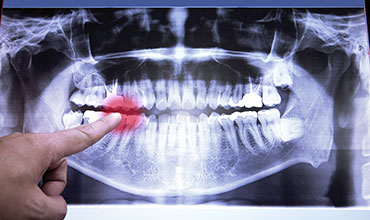What is Oral and Maxillofacial Surgery?

Oral and Maxillofacial Surgery is the specialty of Dentistry that concentrates on the diagnosis and surgical management of oral and maxillofacial pathologic conditions, including epithelial diseases and mesenchymal disorders of soft and hard tissues.
Because Oral and Maxillofacial Surgery is a surgical specialty it is easiest to define its spectrum by reviewing the types of surgery its specialists perform:
- Dento-alveolar surgery, including extraction of teeth, recontouring of alveolar bone, and uncovering of teeth for orthodontic traction.
- Surgery to support oral and facial prosthetic devices, including bony and soft tissue surgery to create favorable anatomy for dentures, interosseous implants to retain oral prostheses and facial prostheses such as alloplastic ears, noses, and eyes.
- Surgical removal of soft tissue and bony tumors of odontogenic and other origins.
- Orthognathic Surgery, which is surgery to reposition cheek and orbital bones, nasal structures, upper and lower jaws and chin. This is generally done in conjunction with orthodontic movement of the teeth, but is also done to facilitate placement of prosthetic devices.
- Reconstruction of congenital, developmental, post-trauma, post-tumor, or aging related defects in oro-facial tissues, including forehead-temporal regions and more anterior and inferior facial structures. Cosmetic surgery is included in this scope, and includes surgery of the forehead, brows, eyelids, ears, facial skin, and neck.
- Trauma surgery for trauma of the head, neck, and facial areas. In the case of complex multi-system trauma, Oral and Maxillofacial Surgeons function as members of multi-specialty teams which include Emergency Room Doctors, General Surgeons, and other surgical sub-specialists, such as Neurosurgery, Ophthalmology, Otolaryngology, and Plastic Surgery.
- Temporomandibular Joint (TMJ) surgery for functional or inflammatory disorders of the joint soft tissues, bony disorders such as osteoarthritis or ankylosis, or TMJ tumors.
- In conjunction with many outpatient surgeries, Oral and Maxillofacial Surgeons deliver intravenous sedation and some types of general anesthesia to manage patient anxieties and improve patient comfort. Oral and Maxillofacial Surgeons receive more training in the delivery of these services than any other type of doctors except Anesthesiologists.
